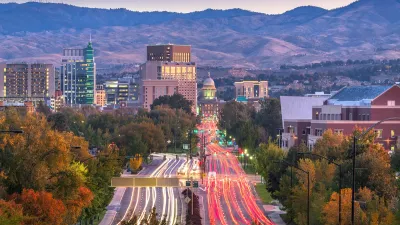NC Rep. Price Harrison hopes that the third time's a charm when he reintroduces legislation requiring higher auto emissions standards. If it passes, the state's standards may start looking more like California's within the coming year.
"Federal environmental regulators announced last week that they will reconsider a request by California and 13 other states to control greenhouse gases from motor vehicles. That may kick-start debates in other states about which is preferable, the so-called federal CAFE (Corporate Average Fuel Economy) standard or the more stringent California standard.
The Obama administration plans to set new federal standards for 2011 model-year autos as part of a 2007 law to require new cars and trucks to achieve 35 miles per gallon by 2020, a 40 percent increase. The California standard would yield an estimated fuel economy of 43 miles per gallon by 2020.
An analysis by the N.C. Division of Air Quality suggests that the California rules would be more effective at reducing greenhouse gases than the federal CAFE program. The agency estimates that adopting the California standards instead of the federal standards would reduce greenhouse gas emissions in the state by 40 percent between 2009 and 2020.
'Emissions is not something people talk about when they go buy a car,' said Anne Tazewell, transportation program manager at the N.C. Solar Center at N.C. State University. 'It's a big issue. Vehicles are a major source of our urban air quality problems.'"
FULL STORY: Third volley for cleaner cars

Alabama: Trump Terminates Settlements for Black Communities Harmed By Raw Sewage
Trump deemed the landmark civil rights agreement “illegal DEI and environmental justice policy.”

Planetizen Federal Action Tracker
A weekly monitor of how Trump’s orders and actions are impacting planners and planning in America.

The 120 Year Old Tiny Home Villages That Sheltered San Francisco’s Earthquake Refugees
More than a century ago, San Francisco mobilized to house thousands of residents displaced by the 1906 earthquake. Could their strategy offer a model for the present?

In Both Crashes and Crime, Public Transportation is Far Safer than Driving
Contrary to popular assumptions, public transportation has far lower crash and crime rates than automobile travel. For safer communities, improve and encourage transit travel.

Report: Zoning Reforms Should Complement Nashville’s Ambitious Transit Plan
Without reform, restrictive zoning codes will limit the impact of the city’s planned transit expansion and could exclude some of the residents who depend on transit the most.

Judge Orders Release of Frozen IRA, IIJA Funding
The decision is a victory for environmental groups who charged that freezing funds for critical infrastructure and disaster response programs caused “real and irreparable harm” to communities.
Urban Design for Planners 1: Software Tools
This six-course series explores essential urban design concepts using open source software and equips planners with the tools they need to participate fully in the urban design process.
Planning for Universal Design
Learn the tools for implementing Universal Design in planning regulations.
Clanton & Associates, Inc.
Jessamine County Fiscal Court
Institute for Housing and Urban Development Studies (IHS)
City of Grandview
Harvard GSD Executive Education
Toledo-Lucas County Plan Commissions
Salt Lake City
NYU Wagner Graduate School of Public Service





























